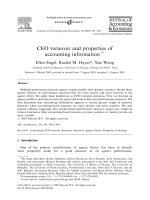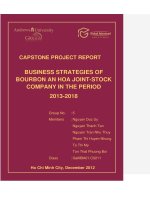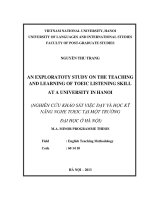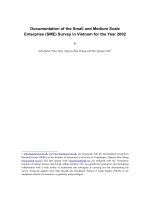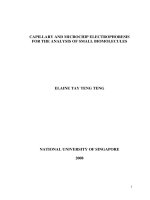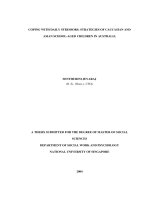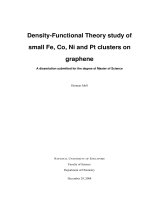Employee turnover and retention strategies of small and midium enterprise service businesses in hanoi
Bạn đang xem bản rút gọn của tài liệu. Xem và tải ngay bản đầy đủ của tài liệu tại đây (223.9 KB, 17 trang )
Employee Turnover and Retention Strategies of Small and Medium Enterprise
Service Businesses in Hanoi
(Summary)
A RESEARCH PROPOSAL PRESENTED TO THE FACULTY OF
GRADUATE SCHOOL
SOUTHERN LUZON STATE UNIVERSITY LUCBAN, QUEZON,
PHILIPPINES
THAI NGUYEN UNIVERSITY S.R. VIETNAM
IN PARTIAL FULFILLMENT OF THE REQUIREMENTS FOR THE DEGREE
DOCTORS IN BUSINESS ADMINISTRATION
Advisor : Prof Conrado Abraham
Name: Ngo Thi Mai
English name: Susan
i
CHAPTER I: INTRODUCTION
1.1.Background of the study
A general idea of the sustained presence of service is very important to understand the research
environment. In addition to benefits such as legal and mandatory provident fund and service, here
is a list of other benefits given to employee of SMEs service businesses and enjoy the following:
Group Insurance Scheme,Personal Health Care (Regular medical check-ups), The lunch
and Transportation subsidy, Credit Card businesses,Recreation, Cafeteria, ATM and Concierge
facilities , Mobile Phone / Laptop, Loans, Educational Benefits,Performance based incentives,
Flexi-time, Flexible Salary Benefits, The cultural exchange programs, Wedding Day Gift,
Employee Referral progams, Employee Stock Option Plan
Now, the actual question, why people are leaving? What types of retention strategies are
required? What is expected from HR Professional and how they can address this issue?
1.2.Statement of the problem
An important issue facing by the SMEs service is retaining employees in the organization. In the
context of globalization, Small and medium scale enterprises (SMEs) are losing a large number of
employees, especially managers really excellent for large multinational companies.
Turnover or staff turnover or labour turnover is the rate at which an employer gains and loses
employees. Simple ways to describe it are "how long employees tend to stay" or "the rate of traffic
through the revolving door". Turnover is measured for individual companies and for their service
as a whole. If an employer is said to have a high turnover relative to its competitors, it means that
employees of that company have a shorter average tenure than those of other companies in the
same service. High turnover may be harmful to a company's productivity if skilled workers are
2
often leaving and the worker population contains a high percentage of novice workers. So that,
companies often take a deep interest in their employee turnover rates because replacing workers
can be a costly part of doing business. When a company must replace a worker, it incurs direct and
indirect expenses. All of the tasks that must be performed during the process cost money, take
time or do both. In addition, there can be a loss of productivity during the time after the former
employee leaves and the new employee has been fully trained. For some companies, replacing
employees also could make it difficult to retain clients or customers with whom those employees
worked. . Normally managers view these company as public bar or just a stepping stone to climb
to prestigious MNCs. They are leaving when they are being grow up in strength.
How can design strategies to retain employees? Well as consideration to choose the best strategy
to be applied in employees retention. This is a difficult question that many Small and Midium
Enterprise Service Businesses in Hanoi are eager to find answers.
1.3. Significance of the study
Success in employee retention and attraction is very important for long term health and success
of any organization. The ability to retain and keep your best employees ensurescustomer
satisfaction, employees satisfied, retain institutional knowledge and learning and succession
planning effectively.
Do not retain a key employee is costly to any organization because in addition to the cost to recruit
and select a new employee other issues such as training time and investment; lost knowledge, and
possibly insecure co-workers will all have an impact on the company.
Attraction and retention of staffs in particular “key employees” is one of the largest challenges for
the company
The traditional approaches to attract and retention are not as effective due in part to generational
change and there is a need to take a more multi dimensional approach to the issue. Retaining
qualified employees in a labor intensive, demanding, and fast-paced work environment is a major
struggle in the hospitality service. With the growth of tourism nationwide and the development of
hotels, resorts, restaurants, spas and casinos, there is a limited supply of staff that are well-trained
and experienced in the day-to-day operations, leaving a limited pool of qualified employees to
hire. So that,
3
Firstly, retaining qualified, high-performing employees is crucial to an organization.
Challenging hiring process: From a large pool of candidates, the HR professional screens
job applicants and carry out preliminary interviews. Shortlisted candidates are then forwarded to
managers who make further judgments to ensure that the most appropriate candidates are hired.
Hiring the right candidates normally requires lots of time.
Costly orientation and training: As an individual starts a new job, he is often given
orientation which informs him about organization goals, culture and background. Also, training is
provided to help new employee have necessary skills to perform his work. When an individual
suddenly leaves an organization, it would cause wastage of time and money. The HR department
would be required to start all over again the recruiting process for vacancies as well as conduct
other orientations and training. Searching for appropriate staff is a tedious task and it is a huge
waste of effort when an employee quits.
High possibility of resigned worker joining competitors: When this happen, employees may
bring strategies, policies from their current company to the new one. Many secrets of previous
organization may be revealed in case of leaking out essential data, document, and statistics.
Companies can limit such cases by requiring new joiners sign a document promising not to divulge
any information as they leave. Another effective way to retain employees is to implement strict
policies to prevent people from joining competitors.
Better performance of long-term employees: Compared to workers who change jobs often,
people who work for a long period have more experience in working for the company because they
understand its rules and policies as well as its culture. Therefore they can perform their duties
much better.
Time for individual adjustment with others : Normally time is required to let people know
and get on well with each other. An employee will understand his workmates better if they work
together for longer time therefore the productivity will be enhanced. Adjustment problems occur as
someone is replaced for an existing staff. Others tend to find it difficult to make a comfort level
with the new comer. Moreover, after establishing a certain relationship with the old staff, they face
a challenge in adjusting with the new one and especially trusting him. It is common that people
compare a new person with the previous employee and always discover his faults.
Loyalty from long-term individuals: As someone sticks to an organization for a long time, he
normally receives more benefits and incentives thereby forming a favor toward the management.
4
Necessity in retaining qualified and experienced employees: High-performing employees are
important to every company as they can bring their creativity, difference, boost the productivity
and help in achieving better outcome for the organization. Organizations will definitely struggle
without these top performers therefore it is essential to keep them staying happy and not looking
for changes. The management needs to value those who can bring real benefits to companies and
make special effort to retain as well as encourage them.
Secondly, Retention is a big challenge
Considerable changes are occurring in the labor market and offices which lead to altering the way
company link to its workers. Selecting, recruiting and retaining knowledgeable staffs have become
a serious concern to any organization and business. To become leading player in an industry, it is
essential for companies to meet their people’s needs by understanding them and applying
appropriate strategies.
Robust economic growth, changes in people mind about entering a profession, corporate retreats,
young workforce, and life balance have led to a fierce battle for skilled employees. At the same
time, people have different views about working. They tend to be more family oriented, pay more
attention to living standard and job status.
To retain people and attract new talents, it is important that managers learn the reasons for
fluctuations in labor market and be able to determine what their people want to fulfill their needs.
There are harsh competitions between companies for scare talented workers.
Inside communication is a tool to make employees understand about their own working place, feel
good about it and perceive equity.
CHAPTER II: REVIEW OF RELATED LITERATURE AND STUDIES
2.1 Literature Review
2.1.1 Employee turnover
There are many a necessity to better understand the staff turnover reasons in order to become
capable to tackle their damaging consequences, concrete: .
Types of staff turnover , Reasons for employee turnover , Consequences of employee turnover ,
Employee Turnover in Project Context
2.1.2 Employee retetation strategies
5
Retention Factors for all Employees
Skill recognition, Learning & Working Climate, Job Flexibility, Cost Effectiveness,Training,
Benefits , Career Development, Superior-Subordinate Relationship,
Compensation ,
Organizational Commitment, Communication , Employee Motivation:
2.2 Theoretical and conceptual framework
+) How to construct theoretical framework
With a lot of equity theory outlined above, I choose Adam's Equity Theory theory application in
the workplace
The Equity Theory in the Workplace
Adam's Equity Theory holds that worker motivation is influenced by employees' perception of the
existence of fair treatment in the workplace. This typically consists of such factors as fairness in
the selection of employees, evaluation of performance and distribution of rewards and
compensation. The use of equity theory in the workplace allows managers to examine worker
relationships and manage employees in a fair and equitable manner that encourages productivity.
Exhibit 1.1. Adam' Equity Theory
6
Inheritance above studies, we can see: there are many employee retention strategies are available
in the SMEs service businesses, special in the SMEs service businesses in Hanoi.
In my
researcher is focused interested in three retention strategies and its applicability in the service. I
have classified three strategies according to the solution provided
1. Exclusive organizational structure strategy
2. Mobile benefit strategy
3. Inside communication strategy
7
Chapter 3. METHODOLOGY
3.1 Resaerch Design
3.1.1.Research objectives
1. To study the influence of exclusive organisational structual on retention
2. How exclusive organisational structure can help in dealing with employee attrition?
3. To determine whether increase in retention can be caused by mobile benefit structure.
4. How mobile benefit structure can help in dealing with employee attrition?
5. How an Inside communication strategy can be carried out in the organization?
3.1.2.Research question
1. To learn company structure is related with employee showing for staying the company.
2. The proportion of employee attrition can be tackled by applying exclusive organizational
structure
3. To determine the relationship between employees’ decision to stay with company and
employee's benefit on variable benefit is related to employee trust for staying the company.
4. The proportion of employee attrition can be tackled by applying mobile benefit structure.
5. What is the comment of employee on the success of carry of Inside communication
strategy in SMEs service businesses in Hanoi?
3.5 Procedure
8
The data collected through questionnaire and the records available was examined in detail. It was
further classified and tabulated with the help of Microsoft excel and SPSS service
Statistical tools
Chi-square test and Sign test are used for testing the hypothesis
CHAPTER IV. RESULTS AND DICUSSION
4.1 Results
Table No 4.6 :Table for Exclusive organization struture strategy
Observed
Data
Preference for staying the
company
Job title
Expected
data
Employees who value job titles
Employees who do not
Total
etention
32
72
104
Employees who value job titles
Employees who do not
66,56
37,44
P value =
R
erent
40
32
72
Indiff
46,08
25,92
Attrition
184
40
224
Total
256
144
400
143,36
80,64
5,53366E-19
P value = 5,53366E-19 〈 0.05 = α ⇒ H0a:has been rejected H1a is being accepted
Conclusion
From the above test we can conclude that the Exclusive organizational structure is dependent to
retention of the employee.
9
+) In the total sample population 400 have 224 respondents attrition and Among 224 respondents
there are 184 respondents, who are employees who prefer job title. So 184 as a percentage of total
sample population (400) is 46 percents. Therefore, the Exclusive organization structure strategy
can be apply to 46 percents of the population, this will increase the retention of the employees in
the SMEs service businesses in Ha Noi.
Table 4.7: Table for Mobile benefit strategy
Observed
Data
Observed
Data
Preference for
staying the company
Mobile
Benefit structure
Employees who value mobile benefit structure
Employees who don’t value mobile benefit
structure
Total
Expected
data
P value =
Employees who value mobile benefit structure
Employees who don’t value mobile benefit
structure
Retention
72
Indifferent
32
Attrition
40
144
32
104
40
72
184
224
256
400
37,44
46,08
80,64
66,56
46,08
143,36
1,31E-19
Pvalue = 1,31E-19 〈 0.05 = α ⇒ H0b:has been rejected H1b is being accepted
Conclusion
From the above test we can conclude that Mobile benefit structure is dependent to retention of the
employee.
+) In the total sample population 400 have 224 respondents attrition. Among those
224
respondents, there are only 40 respondents preferring frequent adjustment in benefits, making 10%
10
in total Therefore, the Mobile benefit strategy can solve only 10 percents, this will increase the
retention of the employees in SMEs service in Hanoi. The strategy is not successful in handling
the problem of attrition.
Table 4.8 : Table for Inside communication strategy
Total plus
Total
Total sign
sign
minus sign
(n)
144
200
344
p
0,5
q
σ
0,5
0,026959
z
1,64
p- z* σ
0,455788
+/-
0,418605
Conclusion
From the above test we can conclude that the opinion of SMEs service businesses employees are
not favorable for the implementation of Inside communication strategy
Chapter 5: SUMMARY, CONLUSIONS AND RECOMMENDATIONS
5.1 Summary
5.1.1 From the research on Exclusive organizational structure strategy
+) In the SMEs service businesses in Hanoi where have 56 percents attrition and in which have
about 82 percents ( ≈ 184/224) is giving up the company to improve their status. All other reasons
are only 18 percents( ≈ 40/224)
11
+)Job titles and employee retention are related to each other. So the company structure can affect
employee decision to stay the company
+) Retaining talent can be helped by providing appropriate job titles which show authority and
responsibility as well as importance.
+) The outstanding advantage in implementing Exclusive organizational structure is reducing the
employees’ comparison of positions with those similar in competitors.
+) This has shown that the Exclusive organizational structure strategy can solve 46 percents of the
total SMEs service businesses. So this strategy is applicable to 46% in total population of
employees in SMEs service business.
5.1.2. From the research on Mobile benefit structure strategy
There is a relationship between employee’s preferences for benefit structure is related to
employee preference for staying the company.
There are 56 percents attrition and in which have 17,86 percents ( ≈ 40/224) prefers periodic
change in benefit structure
+) Solve the employee’s attrition problem by Mobile benefit structure strategy is only 10 percents
, So the extent to which this strategy can be applied is only 10 percents for the total employees in
the SMEs service businesses.
+) We can see, if we applying this strategy is not economical because there is only 10 percents of
the total employees can be stopped from attrition by implementing Mobile benefit strategy.
5.1.3. From the research on Inside communication strategy
12
From the analysis, we can see : The inside communication strategy is not advantage for applying
in the SMEs service businesses in Hanoi .
5.2 Conclusions
The study shows that:
The study indicates that:
+) There is a correlation between job titles and employee retention in the organization.
The Exclusive organizational struture strategy can be used in the SMEs service businesses in Ha
noi.
+)The Inside communication cannot be used in the SMEs service businesses. Although
there is an influence of benefit structure on employee’s decision on staying the company, but we
are too focused to research that this correlation is not beneficial for applying the mobile benefit
structure strategy.
+) The thesis for retention strategies in the SMEs service can be used to help employers
have a better understanding about their employees therefore they will be able to design proper
management strategies. For example: “A good employee will have a sense of proud in the job then
the work quality, efficiency, and retention increases significantly. Opposite, employees with low
self esteem and display lack of eagerness exhibits negative feelings at the work place. Defend the
self esteem of the employee will be top problem for future company. One of the best ways to
achieve that is by providing socially acceptable positions titles to the employees”.
5.3 Recommendations
Recommendations for employee retention in the SMEs service businesses in Ha Noi and
responses from the employee survey, along with the findings from nationally published reports,
we need address good the issues.
The first,we must understand: How to Reduce Employee Turnover?
13
Many people agree turnover is a growing issue, particularly as hiring picks up.
According Nicole Allard, Q, Krystle, Jack Herrick, If you want to have an effective hiring
campaign, you have to think long term. When hiring new employees, it can be difficult to consider
how they will benefit your organization for the long haul. So that , Don't hire out of desperation.
During the hiring process, it’s important to look for candidates who will fit into the company
culture with ease. A highly skilled candidate is great, but to avoid turnover you’ll also need a
candidate who will love working for your company long-term. – Josh Tolan, Spark Hire
The second, How to improve employee retention higher?
One the principle which the manager always must remember that is " listen and insights deeply"
People management and balance reduces turnovers. It’s about people management. It’s about
managing their expectations, their motivations, their problems, and even their joys. Instead of
asking “how hard will you work for our company”, ask people what they will do to balance their
work/home life. Balanced, contented employees will be productive, successful, and loyal. – Clara
Lippert Glenn,The Oxford Princeton Programme
The third, that is the communication
Because open communication is extremely important to employees (Honore, 2009), management
must take the initiative in developing a communication process that meets employee needs.
And finaly, we can use the Exclusive organizational structure strategy . Concrete,
Create a company-specific organizational structure and positions is the crux of this theory. This
will reduce the tendency of employees to positions and compare their benefits with one of the
other companies. Rather than force employees to limit his talents to the job structure, job titles set
by the skills, knowledge and abilities of employees. If an organization has a structure unique
position titles and their responsibilities to keep employees focused on the company rather than the
selection of jobs in other companies. the following key elements must be present in the original
structure.
14
Establish clear expectations
When people enter into a company for the first time as an employee, he / she may have
expectations about salary, working environment ... the demand for workers is the desire to live a
decent salary, when this goal is made staff will search for social status, such as the title of the
position and structure compelling interests meet needs of human selfishness. Therefore, companies
must manage expectations by understanding employee perceptions.
+) Attitudes of staff to other institutions and the structure of its benefits for the same
position be?
+) What is expected of employees from the employer / teammembers?
+) What are the parameters to measure their performance?
+) Present good communication channels within the organization.
+) What would be the rewards, if employees exceed expectations?
If employees do not have any certain expectations, how the employer will assess, employees?
This must be based on some criteria.
Employees must feel that their role is very important for the company. Also the title of the
position you have to be socially acceptable. It would be selfish to meet the needs of workers.
Setting expectations begin the process. Management needs to sit down with each employee and
determine what their expectations. When expectations are not clear, the employee may not be in
sync with the current needs and priorities of their work. Setting expectations is not a one-time
operation and performance. Jobs change. Priorities change. Resource change. Managers need to be
amended and a new set of expectations throughout the year. Setting expectations revolves around
the following three areas:
+) Primary job responsibilities
+) Elements and performance criteria
+) Objectives
15
Why is important to set expectations? Quite simply, this process could be the basis of the
improved dynamic environment within your responsibility. If your employees know what is
expected of them, it allows them to focus on their results and track against the prescribed
standards. Environment in which expectations are not clear, or change from week to week, seldom
create work groups with high performance.
There are some principles should drive expectations :
1. Principles of clarity
Expectations should focus on outcomes, not activities.
Identify goals often requires some thought on the part of management because it is easy to fall
into the "trap operation."
2. The principle involved.
Principles related help determine "why" of the transfer. If your employees have a full
understanding of the importance of the project, they can make adjustments to unexpected factors
arise in the process. They will probably also have commitments for results because they can see
more easily how it fit the big picture and their efforts to influence how firms.
This knowledge is usually done through dialogue between managers and subordinates, allowing
closer examination of the situation and feedback and discussion. This process is built goodwill
with employees and sets the stage for additional responsibilities.
3. The principle of simplicity.
Simply create a sense of land for workers when they attempt to accomplish tasks. If managers
identify job simple, straightforward terms, employees will find it easier to follow through desire of
managers. To do this, a manager must identify the main message in a fashion that the employee
can take.
4. Capacity and ability to apply skills
16
Capacity and skills to use as an environmental factor your key employees looking at your work
place. A motivated employee wants to contribute to work areas outside of the job description of
your specific. How many people can contribute more than they currently do? You just need to
know the skills, talents and experience of them, and take the time to dig into it.
5. Principles of fairness and equal treatment
Recognition of fair and equitable treatment is important in employee retention.
6. Opportunities for advancement (career prospects)
The best staff, who you want to keep, often looking for opportunities to learn and develop their
knowledge, skills and careers. If you do not have the opportunity to try new opportunities, sit on
committees challenging, attend seminars and read and discuss books, they feel they will stagnate.
Career-oriented, valued employee must experience growth opportunities within your organization.
17

